Related Research Articles

Burkina Faso is a landlocked country in West Africa that covers an area of around 274,200 square kilometres (105,900 sq mi) and is bordered by Mali to the northwest, Niger to the northeast, Benin to the southeast, Togo and Ghana to the south, and the Ivory Coast to the southwest. The July 2019 population estimate by the United Nations was 20,321,378. Previously called Republic of Upper Volta (1958–1984), it was renamed "Burkina Faso" on 4 August 1984 by President Thomas Sankara. Its citizens are known as Burkinabé or Burkinabè, and its capital and largest city is Ouagadougou. Due to French colonialism, the country's official language of government and business is French. However, only 15% of the population actually speaks French on a regular basis. There are 59 native languages spoken in Burkina, with the most common language, Moore, spoken by roughly 50% of Burkinabé.

Dyula is a language of the Mande language family spoken in Burkina Faso, Ivory Coast and Mali. It is one of the Manding languages and is most closely related to Bambara, being mutually intelligible with Bambara as well as Malinke. It is a trade language in West Africa and is spoken by millions of people, either as a first or second language. Like the other Mande languages, it uses tones. It may be written in the Latin, Arabic or N'Ko scripts.

Ouagadougou is the capital of Burkina Faso and the administrative, communications, cultural, and economic centre of the nation. It is also the country's largest city, with a population of 2,453,496 in 2019. The city's name is often shortened to Ouaga. The inhabitants are called ouagalais. The spelling of the name Ouagadougou is derived from the French orthography common in former French African colonies. and has been the Capital since 2002.

The music of Burkina Faso includes the folk music of 60 different ethnic groups. The Mossi people, centrally located around the capital, Ouagadougou, account for 40% of the population while, to the south, Gurunsi, Gurma, Dagaaba and Lobi populations, speaking Gur languages closely related to the Mossi language, extend into the coastal states. In the north and east the Fulani of the Sahel preponderate, while in the south and west the Mande languages are common; Samo, Bissa, Bobo, Senufo and Marka. Burkinabé traditional music has continued to thrive and musical output remains quite diverse. Popular music is mostly in French: Burkina Faso has yet to produce a major pan-African success.
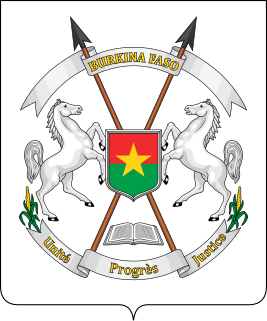
The regions of Burkina Faso are divided into 45 administrative provinces. These 45 provinces are currently sub-divided into 351 departments or communes.

The Burkina Faso national football team, represents Burkina Faso in men's international football and is controlled by the Burkinabé Football Federation. They were known as the Upper Volta national football team until 1984, when Upper Volta became Burkina Faso. They finished fourth in the 1998 Africa Cup of Nations, when they hosted the tournament. Their best ever finish in the tournament was the 2013 edition, reaching the final.

Roch Marc Christian Kaboré is a Burkinabé politician who has served as the President of Burkina Faso since 2015. He was the Prime Minister of Burkina Faso between 1994 and 1996 and President of the National Assembly of Burkina Faso from 2002 to 2012. Kaboré also served as President of the Congress for Democracy and Progress (CDP) until his departure from the party in 2014. He founded the People's Movement for Progress party that same year.
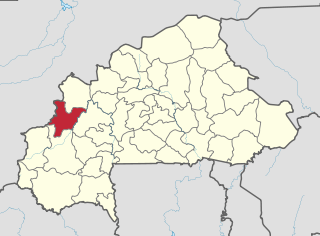
Banwa is one of the 45 provinces of Burkina Faso and is in Boucle du Mouhoun Region. The capital of Banwa is Solenzo. In 2019 it had a population of 345,749.

Kouritenga is one of the 45 provinces of Burkina Faso, located in its Centre-Est Region. In 2019 the province had a population of 479,930. Its capital is Koupéla.

Boucle du Mouhoun is one of Burkina Faso's 13 administrative regions. It was created on 2 July 2001 and had a population of 1,898,133 in 2019. It is the 4th most populous region in Burkina Faso, and contains 9.26% of all Burkinabé. The region's capital is Dédougou. Six provinces make up the Boucle du Mouhoun region—Balé, Banwa, Kossi, Mouhoun, Nayala, and Sourou.
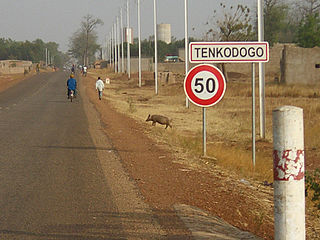
Tenkodogo is the capital city of Boulgou Province and the Centre-Est Region of Burkina Faso with a population of 58,600 (2019).

The mass media in Burkina Faso consists of print media and state-supported radio, news, and television stations, along with several private broadcasters with programs consisting of sports, music, cultural, or religious themes.
Articles related to Burkina Faso include:

Sport in Burkina Faso is widespread and includes football, basketball, baseball, cycling, rugby union, handball, tennis, athletics, boxing and martial arts.
Syer-Tenyer, or Western Karaboro, is a pair of Senufo dialects of Burkina Faso.
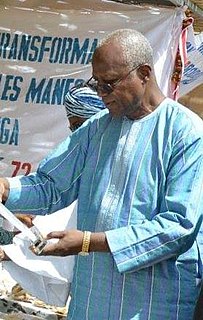
Christophe Joseph Marie Dabiré is a Burkinabé politician who is serving as the Prime Minister of Burkina Faso since 24 January 2019. He was appointed to the position of Prime Minister by President Roch Marc Christian Kaboré following the resignation of Paul Kaba Thieba and his cabinet. Dabiré had previously represented Burkina Faso at the West African Economic and Monetary Union, and went on to serve as a minister under former president Blaise Compaoré from 1994 to 1996, with Kaboré holding the title of Prime Minister.
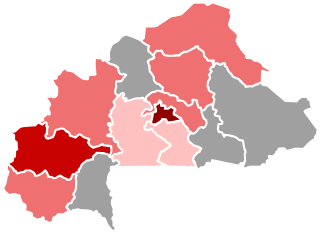
The COVID-19 pandemic in Burkina Faso is part of the ongoing worldwide pandemic of coronavirus disease 2019 caused by severe acute respiratory syndrome coronavirus 2. The virus was confirmed to have reached Burkina Faso on 9 March 2020. The death of Rose Marie Compaoré, a member of the National Assembly of Burkina Faso, on 18 March marked the first recorded fatality due to COVID-19 in Sub-Saharan Africa.
References
- ↑ Kar at Ethnologue (18th ed., 2015)